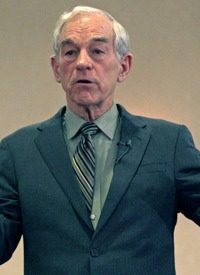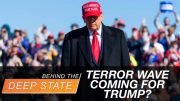
Though Paul was initially almost wholly ignored by most politicians and the mainstream media, and treated as though he was a fringe, unviable candidate, he has surged in popularity in poll after poll. Now ignoring him is no longer an option.
According to the most recent Public Policy Poll (PPP), Ron Paul is firmly in first place in Iowa, with 23 percent of the vote, followed by Mitt Romney, with 20 percent, and Gingrich, with just 14 percent of supporters.
The poll marks a significant decline for Newt Gingrich, who for a period enjoyed front-runner status in Iowa. PPP reports, “Gingrich has now seen a big drop in his Iowa standing two weeks in a row. His share of the vote has gone from 27 percent to 22 percent to 14 percent. And there’s been a large drop in his personal favorability numbers as well from +31 (62/31) to +12 (52/40) to now -1 (46/47).”
Much of that decline can be attributed to the Paul campaign's ads in Iowa that have targeted Gingrich, revealing that he is not the conservative he purports to be. Meanwhile, Ron Paul’s increasing popularity is largely attributed to the success of his campaign. Of those polled, 22 percent believe Paul’s campaign to be the best run in the state, compared to just eight percent who said the same of Gingrich and five percent for Romney. Paul’s campaign has had a highly recognizable presence in the Hawkeye State, which resonates well among those who contend that it is extremely important that a candidate spend a lot of time in Iowa.
Likewise, Paul’s support seems to pervade a wide variety of groups. According to PPP,
Paul's base of support continues to rely on some unusual groups for a Republican contest. Among voters under 45 he's at 33% to 16% for Romney and 11% for Gingrich. He's really going to need that younger than normal electorate because with seniors Romney's blowing him out 31-15 with Gingrich coming in 2nd at 18%. Paul is also cleaning up 35-14 with the 24% of voters who identify as either Democrats or independents. Romney is actually ahead 22-19 with GOP voters. Young people and non-Republicans are an unusual coalition to hang your hat on in Iowa, and it will be interesting to see if Paul can actually pull it off.
In other words, Ron Paul seems enroute to a primary victory. Such news does not sit well with Anonymous, which posted a two-minute video on YouTube calling the political system corrupt and urging its supporters to “peacefully shut down” the Iowa caucuses.
The threat has officials on alert. The Associated Press noted,
Republican Party officials in Iowa are taking new steps to secure their vote counting systems after an anonymous threat suggested computer hackers could attempt to disrupt next month’s presidential nominating caucuses.
Investigators aren’t sure whether [Anonymous' YouTube] video is authentic, but party officials have instructed precinct caucuses to use paper ballots as a backup system and taken other steps to protect the database and website that displays caucus results.
Additionally, Drew Ivers, chairman of Ron Paul’s campaign in Iowa, confirmed that state officials and consultants will be monitoring for any hacking threat using software and other methods. He admitted, however, that it is extremely difficult to prevent a hacker. “How do you stop a hacker?” he asked. “That’s the question.”
But Ivers also pointed out that any damage done by a hacker is not irreparable. “If a hacker gets in and messes it all up, we can reconstruct the results. It would take a little while. It might take a day or two, but we can do it,” he assured voters.
Despite the feverish response to the threat, caucus votes cannot be hacked because there is a literal count of the number of people who gather for each candidate, and all positions are public. Ironically, paper ballots, supposedly to be initiated in response to worries of tampering, may be the means used to cancel out a Paul win in Iowa. Instead of merely counting hands of caucus attendees to see who they favor so that everyone can attest to the results, paper ballots could be counted in a back room, where they could be manipulated. (It pays to remember that most Republican bigwigs don't want Ron Paul to win either because he would upset the big-government status quo.)
Still, the threat is indicative of the fear that a candidate such as Ron Paul generates among his enemies.
The irony of the threat is that the group Anonymous touts itself as the champion of the underdog. It is one of the leading voices behind the Occupy Wall Street movement and has even voiced support for the Occupy the Fed movement, which attempts to echo Ron Paul’s longstanding criticism of the Federal Reserve. Observers ask, what other candidate is more of an underdog than Ron Paul? Even his opponents must admit that Paul is the people’s champion, exemplified best by the passionate grass-roots support that has carried his campaign, which is mostly devoid of big corporation and lobbyist support.
Fear of a Paul victory is not limited to a fringe left-wing group, however. Fox News television host Chris Wallace has already attempted to skew what a Paul win in Iowa would mean, making the argument that it would undermine the credibility of the Iowa caucuses:
The Ron Paul people are not going to like that I’m saying this, but to a certain extent, if Ron Paul wins, it will discredit the Iowa caucus because rightly or wrongly, I think most of the Republican establishment believes he’s not going to end up as the nominee, so therefore Iowa won’t count.
Cenk Uygur, co-founder and main host of The Young Turks, a progressive Internet and radio talk show, remarked on Wallace’s assertion, "Before you were telling us that Ron Paul had no chance of winning. ‘Ron Paul (mock laugh), what a kook, what a crank! Oh, he’s going to win? Well then it doesn’t count.’”
Uygur also pointed out the sudden change of heart that Fox News has had toward the Iowa caucuses, as well as to any of the many straw polls that Paul has won. Up until it became clear that Paul had a good shot at winning in Iowa, Fox News hyped the Iowa caucuses as a significant indication of the momentum of the 2012 presidential election. Suddenly, however, that is no longer true.
“By definition, if Ron Paul wins something, it no longer matters,” noted Uygur.




